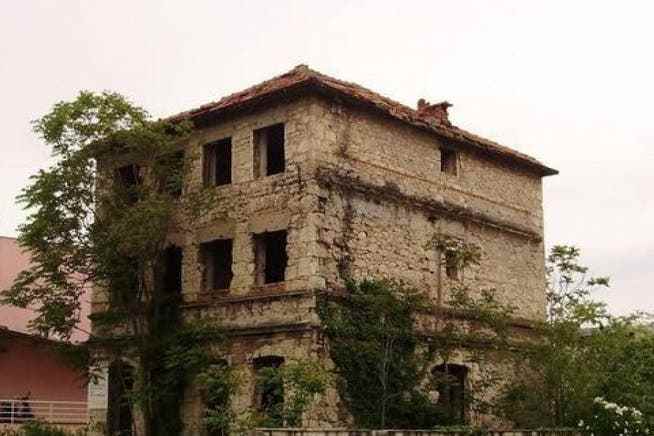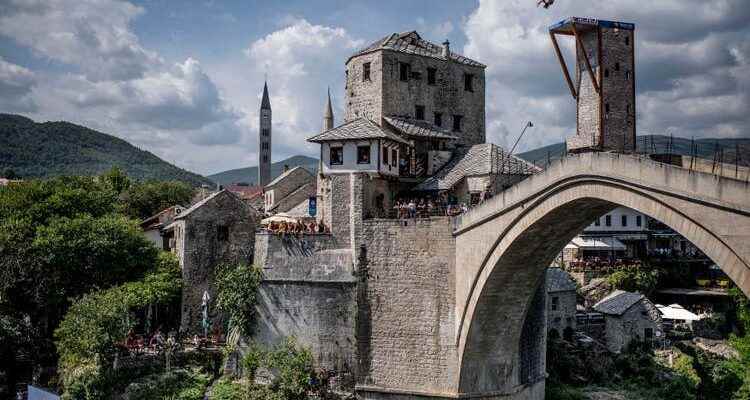Mostar with its famous bridge and its Croatian-Serbian-Muslim population is the largest and perhaps the most beautiful city in Herzegovina. It was horribly destroyed during the Bosnian War. Did you learn something from it? Rather not.
“Stari most”, the 27 meter high “Old Bridge” from Ottoman times, is the symbol of Mostar. It was destroyed by the Croatian army during the Bosnian war and rebuilt in 2004.
I had a friend, his name was Predrag Matvejević. He belonged to my generation and passed away five years ago. If anyone remembers him, it is probably because of his essayistic epic about the Mediterranean, Der Mediterran, translated into over twenty languages.
Much of his writing, however, is in letters to statesmen around the world, trying to use common sense to influence their erroneous policies. He advised Tito, the untouchable leader of Yugoslavia, to retire so as not to experience his physical decline on the throne, a throne that was shaky as a result. “And I conclude that for this country, with all its differences and historical and contemporary contradictions, it would be best if you yourself secured your replacement, (. . .) gradually relinquished your functions as such,” he wrote . After this letter, he was neither detained nor persecuted, but he received no reply either.
Small and large languages
However, while walking in a Zagreb park, he complained to me about how much time he had wasted on this work. Whereby every literary work seems to me as futile as it is crazy. Especially what we do, we from the south of this continent: We can build mountains of books, we can turn ourselves upside down, the beautiful voice of Miroslav Krleža or Miloš Crnjanski hardly gets into the European ear, that also applies to Predrag Matvejević.
It also doesn’t help that his father was Ukrainian! Today, when the European Daltonists see everything around us only color-blindly in two shades, blue and yellow, we, the poets of the Serbo-Croatian language, remain invisible to most European judges, mainly because we live in a wild marriage. The Serbian and Croatian poets have long since been legally separated from the tribunal of history.
It all boils down to the writers of a small language having no message for the people of the great languages. It is easy to forget in which language Hamsun wrote and in which Huizinga. There is one exception to this sad contempt: Ivo Andrić.
European narrow-mindedness cannot jump over the ribbon of the Nobel Order, even if our author’s decisive metaphor was not understood at all: the bridge (Serbo-Croatian «most»). Not only those about the Drina and the Žepa are meant in the titles of his works, but also the bridge as a general symbol of community and brotherhood.
My friend Matvejević was born in Mostar, the city itself christened after such an ancient structure from 1566 that connected the two banks of the Neretva.
The reason why I am writing this text is that this city with the metaphorical name that alludes to human connection and solidarity recently demolished the house where Predrag Matvejević was born. As if a people with a small language made that language even smaller by their actions. Because also said bridge was destroyed in the battles of the last war between the three peoples on the same soil, Croatian, Serbian, Muslim; what stands there today is just a newly built replica. And much of what our people live in there is a replica of something before.
Erased and hushed up
It seems to be common that in every war everything possible is destroyed and burned, this is now practiced every day in Donbass. And apparently, even in peacetime, the destroyers don’t mind destroying the birthplaces of important or unimportant people.

Predrag Matvejević’s birth house when it was still standing.
Who will judge whether Matvejević is such an unimportant person whose birth house was pitilessly demolished to build a convenience store or a garage there? Perhaps each of us from the south of the Balkans is such an unimportant person that one is free to erase any trace of it, and if one does not destroy our birthplaces, one can at least silence us with a clear conscience in every European register.
Incidentally, it doesn’t seem to take war to ruin people’s lives, it’s enough for a bad guy with a lot of money to keep an eye on a certain piece of land in the middle of peace, but that there is something from the history of the same country standing, doesn’t interest him!
I hear now that this city of Mostar, the largest in Herzegovina and perhaps the most beautiful, is applying for the title of European Capital of Culture. This message in itself shows that someone here has quite a lot of courage. What can a city be the capital of which, in a mad war, has first destroyed its emblematic landmark and then, what is even crazier, in the stillness of peace, has destroyed the birthplace of its poet? Glad my friend Predrag escaped this shameful act.
The Serbian writer Bora Cosic, Born in 1932, lives in Berlin and Rovinj. His new book «Operation Kaspar» was recently published by Schöffling. – Translated from the Serbian by Katharina Wolf-Griesshaber.
